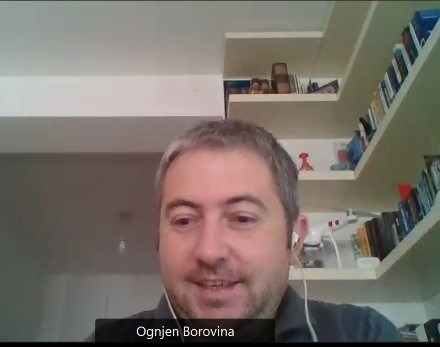Workshop on Control of Cross Border Movement of Mobile Radioactive Sources for Project 60 Participating Countries

In coordination with ISTC the consultancy ENCO organized on 25 and 26 January 2022 a workshop entitled: Control of Cross Border Movement of Mobile Radioactive Sources in accordance with the implementation program of Project 60 Support to the Centre of Excellence of Eastern and Central Africa in Nuclear Security.
 ENCO Senior Experts Vladimir Rukhlo, Igor Svyetlov and Ognijen Borovina made presentations before the 26 attending participants from the African partner countries on relevant topics, ranging from the control of the radioactive sources that are crossing national borders and specific challenges with sources out of regulatory control; to obligations stemming from international instruments, such as the Code of Conduct on the Safety and Security of Radioactive Sources and supplementary guidance, the IAEA Nuclear Security Recommendations on Radioactive Material and Associated Facilities and the Implementation guide for IAEA Security of Radioactive Material in Use and Storage. A special attention during the overview was attributed to the appointment of national focal points for the transportation of sources and other nuclear material.
ENCO Senior Experts Vladimir Rukhlo, Igor Svyetlov and Ognijen Borovina made presentations before the 26 attending participants from the African partner countries on relevant topics, ranging from the control of the radioactive sources that are crossing national borders and specific challenges with sources out of regulatory control; to obligations stemming from international instruments, such as the Code of Conduct on the Safety and Security of Radioactive Sources and supplementary guidance, the IAEA Nuclear Security Recommendations on Radioactive Material and Associated Facilities and the Implementation guide for IAEA Security of Radioactive Material in Use and Storage. A special attention during the overview was attributed to the appointment of national focal points for the transportation of sources and other nuclear material.
 A comparative analysis of bilateral versus multilateral arrangements for exchange of information on sources crossing borders allowed to outline the advantages of both approaches to cooperative interaction that allow actions that go beyond just notification and acquiring consent for export and import. Bilateral agreements are easier to update or modify, and implement, due to unambiguous interpretation. Multilateral arrangements, on the other hand, facilitate the use of unified terminology and procedures for the entire region, standardization and minimization of misunderstanding and loopholes. In addition, they provide better possibilities to track transit through one or more countries in the region. Besides, peer pressure may lead to better implementation and longer lasting institutional memory. as ENCO developed and submitted to all participating countries a Draft Memorandum of Understanding that may help the negotiation and signing of bilateral and/or multilateral agreements.
A comparative analysis of bilateral versus multilateral arrangements for exchange of information on sources crossing borders allowed to outline the advantages of both approaches to cooperative interaction that allow actions that go beyond just notification and acquiring consent for export and import. Bilateral agreements are easier to update or modify, and implement, due to unambiguous interpretation. Multilateral arrangements, on the other hand, facilitate the use of unified terminology and procedures for the entire region, standardization and minimization of misunderstanding and loopholes. In addition, they provide better possibilities to track transit through one or more countries in the region. Besides, peer pressure may lead to better implementation and longer lasting institutional memory. as ENCO developed and submitted to all participating countries a Draft Memorandum of Understanding that may help the negotiation and signing of bilateral and/or multilateral agreements.
Technical solutions underpinning the agreements open the way for accurate and timely exchange of information on sources crossing borders and for compliance with security requirements, limiting information flow on “need to know” basis. The Regulatory Authorities Information System - RAIS 3.2 version – may and should be used for information exchange on movements of sources. Relevant features of RAIS system were presented: design and architecture; concept of operation; information flow; security features; scalability and possible other uses. The “RAIS add on “tool may be used for secure exchange of information on sources. This tool is a new additional function that is separate from RAIS and builds on its data base.
A discussion ensued on the legal and technical aspect of the control of movement of sources.
The next virtual session for the P- 60 participation countries will be a training course for customs officers on the theme: Verification of the Nuclear Security Status and Measures, scheduled for 8 and 9 February 2022.

